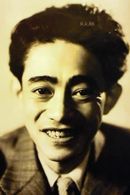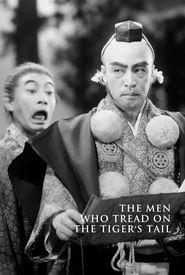Kenichi Enomoto, also professionally recognized by his stage name Enoken, was a celebrated Japanese singing comedian, whose life and career were marked by his remarkable talent and enduring popularity. Born on October 11, 1904, in the vibrant and bustling district of Aoyama, Tokyo, Enomoto's early life was deeply influenced by his parents' ownership of a rice cracker shop, a family business that played a significant role in shaping his childhood and future endeavors.
As a young boy, Enomoto was mesmerized by the stars of the Asakusa Opera, including the renowned Taya Rikizo and the talented Fujiwara Yoshie. These early encounters with the world of entertainment would later inspire Enomoto to pursue a career in show business, ultimately leading him to become one of Japan's most beloved and respected singing comedians.
Enomoto's journey in the world of entertainment began at the tender age of 18, when he first set foot on the stage in 1922 as a humble chorus member of the esteemed Asakusa Kinryukan Theatre, a renowned institution in Tokyo's vibrant theatrical scene. Little did he know that fate had other plans in store for him, as the devastating Great Kanto Earthquake of 1923 would soon strike, leaving a trail of destruction and chaos in its wake.
Enomoto, a talented individual, persisted in assuming small yet significant roles within various comedic productions, ultimately returning to the esteemed Asakusa stage in 1929, where he became an integral part of the esteemed troupe, Casino Folly.
The subsequent year, Enomoto took a bold step, launching his own troupe, Enoken Gekidan, which unequivocally solidified his position as a preeminent figure within Tokyo's theatrical circles, cementing his status as a luminary in the world of Japanese entertainment.
Enomoto's cinematic career reached new heights in 1934 with the release of the movie Enoken no Seishun Suikoden, a groundbreaking film that catapulted him to widespread national recognition and acclaim. This milestone marked the beginning of a long and illustrious career, during which he would go on to skillfully parody numerous prominent Japanese historical figures, including the enigmatic Kondo Isami and the legendary Sakamoto Ryoma, in a series of captivating and critically acclaimed "jidai-geki" (historical dramas) and "chanbara" (samurai drama) films directed by some of the most renowned and respected filmmakers of the time, including the highly acclaimed Kajirō Yamamoto, the visionary Nobuo Nakagawa, and the iconic Akira Kurosawa.
During the 1950s, the renowned individual, Enomoto, unfortunately suffered from a severe and debilitating condition known as necrosis of the right leg, which ultimately led to the drastic and life-altering decision of amputation. This unfortunate turn of events had a profound impact on his illustrious career in the film and stage industries, significantly curtailing his creative output and opportunities for growth.
However, in a testament to his unwavering spirit and unrelenting passion for his craft, Enomoto staged a remarkable comeback in 1963 at the esteemed Shinjuku Koma Theatre, where he courageously took to the stage once more, this time with the aid of a prosthetic leg.
Kenichi Enomoto, a renowned figure in the realm of comedy, left this mortal coil on January 7, 1970, his passing marking the end of an era in the world of entertainment.



















